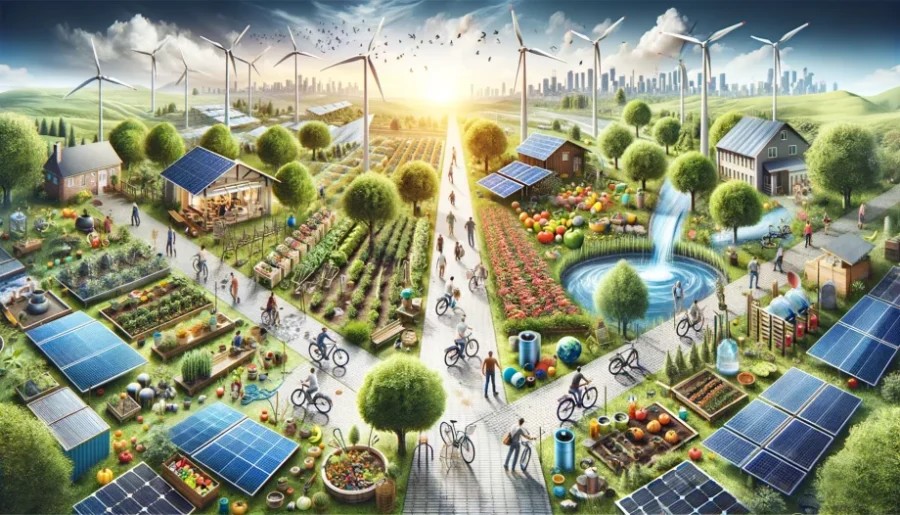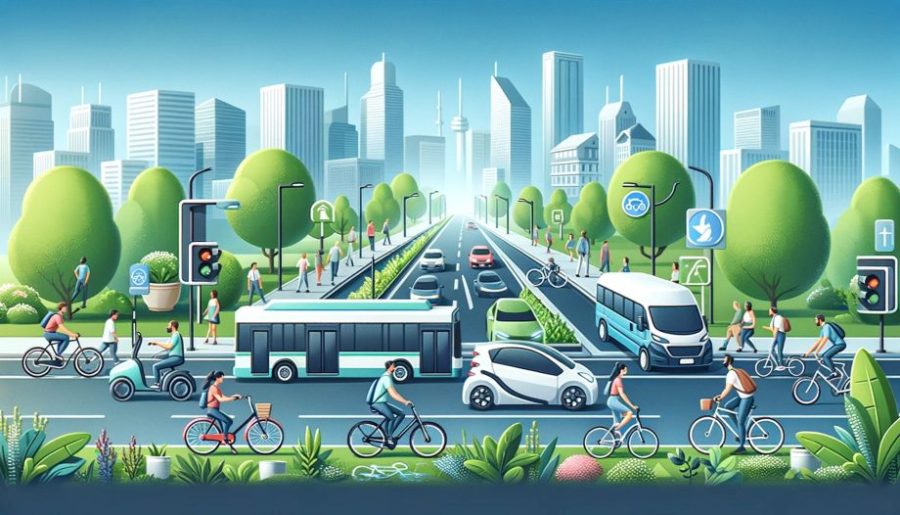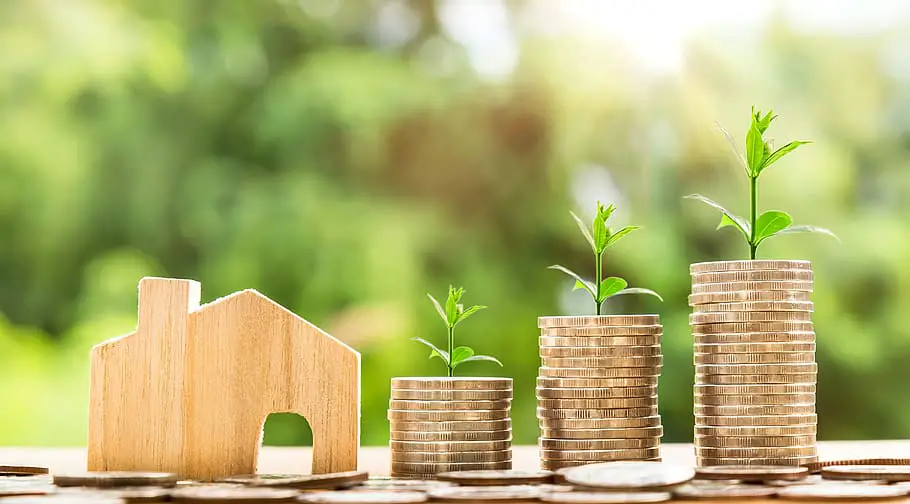
Explore our top sustainability ideas to green up your life! From composting to solar energy, find easy eco-tips for a healthier planet.
Sustainability Ideas Key Takeaways:
- Sustainability ideas focus on eco-friendly practices that reduce environmental impact.
- Key actions include recycling, using renewable energy, conserving water, and supporting sustainable agriculture.
- These practices help preserve resources for future generations while promoting a healthier planet.
Looking to make a positive impact on our planet? Our list of sustainability ideas is here to guide you.
Whether you’re a seasoned eco-warrior or just starting your green journey, these practical tips and tricks are designed to help you live more sustainably.
Dive in and discover how small changes can make a big difference!
Introduction to Sustainability and Actionable Ideas

Sustainability isn’t just a buzzword; it’s a crucial approach to living that ensures our planet remains vibrant and viable for future generations.
It intertwines with every aspect of our lives, from the energy we use to the products we buy and the waste we produce.
In this comprehensive guide, we’re diving into 25 sustainability ideas designed to empower you to make meaningful changes.
These changes not only lessen your environmental impact but also foster economic stability and social equity.
Sustainability in the Workplace Ideas
Implementing sustainability in the workplace involves adopting eco-friendly practices, such as reducing energy consumption, encouraging recycling, and supporting green commuting options, to create an environmentally responsible and resource-efficient working environment.
By embracing these sustainable living practices, you can contribute to a sustainable future that benefits everyone.
Sustainable Development
Sustainable development is an organizing principle that aims to meet human development goals while also enabling natural systems to provide necessary natural resources and ecosystem services to humans. Wikipedia
Understanding the 3 Pillars of Sustainability
Understanding the 3 Pillars of Sustainability is fundamental to grasping the full scope of what it means to live sustainably.
These pillars—environmental protection, economic growth, and social equity—form the foundation of a balanced approach to sustainability.
They remind us that true sustainability requires harmonizing our ecological, economic, and social resources to ensure a thriving planet for future generations.
In this section, we’ll delve into each pillar, exploring how they interconnect and influence our daily choices and the broader strategies for sustainable development.
Environmental Protection
- Practical Steps for a Greener Planet: Uncover specific actions like adopting renewable energy sources, implementing water-saving techniques, and engaging in responsible waste management.
- These practices not only mitigate pollution but also safeguard our natural resources and preserve the rich biodiversity essential for ecological balance.
Economic Growth
- Driving Sustainable Prosperity: Delve into economic strategies that prioritize green technologies, support circular economies, and advocate for sustainable agriculture and manufacturing.
- This approach fosters a resilient economy that thrives on reducing waste, enhancing efficiency, innovating within limits, using sustainable business practices and ensuring prosperity without depleting our planet’s resources.
Social Equity
- Building Inclusive Communities: Examine targeted initiatives aimed at improving access to clean energy, nutritious food, and quality education, particularly in underserved communities.
- By addressing systemic inequalities and promoting inclusive policies, we can ensure that sustainability benefits everyone, regardless of their background or economic status, paving the way for a more just and equitable society.
Embracing Sustainable Living
- Everyday Actions: From reducing energy consumption to minimizing waste, small lifestyle adjustments can have a big impact.
- Community Engagement: See how participating in local sustainability projects or supporting eco-friendly businesses can drive collective action towards a greener future.
The Benefits of Going Green
- Health and Wellbeing: Understand how sustainable living contributes to better health for you and the planet.
- Financial Savings: Find out how eco-friendly choices can also be economical, saving money in the long run through efficiency and reduced consumption.
This introduction sets the stage for a deep dive into each of the 25 sustainability ideas, providing a roadmap for readers to follow as they explore how to integrate sustainable practices into their lives.
Each subpoint not only highlights the importance of sustainability but also offers a clear path for personal and collective action towards a more sustainable world.
1. Compost
Why Compost? Composting organic waste reduces landfill contribution and produces rich soil for gardening. Start by separating your kitchen scraps and yard waste in a compost bin.
2. Recycle
The Power of Recycling: Recycling helps conserve resources, save energy, and reduce pollution. Learn about your local recycling programs and what materials are accepted.
3. Renewable Energy
Switching to Renewable Energy: Consider using renewable energy sources like solar, wind, or hydroelectric systems for your home to reduce reliance on fossil fuels.
4. Conserve Water
Water Conservation Tips: Simple actions like fixing leaks, using water-efficient fixtures, and collecting rainwater can significantly reduce water usage.
5. Start Green Cleaning
Eco-Friendly Cleaning Solutions: Use natural cleaning products to minimize exposure to harmful chemicals and reduce environmental pollution.
6. Solar Panels
Investing in Solar Panels: Solar panels can reduce electricity bills and carbon emissions. Explore incentives and rebates available in your area.
7. Bicycle Rentals
Promote Cycling: Using bicycle rentals or sharing programs for short trips can reduce traffic congestion and lower greenhouse gas emissions.
8. Electric Cars
The Benefits of Electric Vehicles (EVs): EVs offer an eco-friendly alternative to gasoline-powered cars, with lower emissions and reduced fuel consumption.
9. Plant a Tree
Planting for the Planet: Trees absorb CO2, improve air quality, and provide habitat for wildlife. Participate in local tree-planting initiatives.
10. Purchase Reusable Bags
Reduce Plastic Waste: Switch to reusable shopping bags to cut down on plastic waste and protect marine life.
11. Recycle and Compost
Dual Efforts: Combining recycling and composting efforts maximizes waste diversion from landfills and benefits the environment.
12. Reduce Disposable Plastics
Avoiding Single-Use Plastics: Opt for alternatives to single-use plastics, like using metal straws, glass containers, and cloth produce bags.
13. Sustainable Acquisitions
Mindful Purchasing: Choose products made from sustainable materials and companies that practice ethical manufacturing processes.
14. Avoid Disposable Items
Choosing Reusables: Whenever possible, use items that can be reused, such as cloth napkins, rechargeable batteries, and refillable water bottles.
15. Buy Green
Support Eco-Friendly Products: Look for products with eco-certifications, made from recycled materials, or energy-efficient appliances.
16. Buy Local
Supporting Local Businesses: Buying local reduces transportation emissions, supports the local economy, and often results in fresher goods.
17. Change Your Washing Habits
Eco-Friendly Laundry Tips: Wash clothes in cold water, air dry when possible, and use eco-friendly laundry detergents.
18. Check Your Lighting
Energy-Efficient Lighting: Replace incandescent bulbs with LED or CFL bulbs to reduce energy consumption and lower electricity bills.
19. Buy Used
The Benefits of Second-Hand: Purchasing used items reduces waste, saves resources, and often saves money.
20. Create a Campus Garden
Educational Gardening: Campus gardens promote sustainability education, provide fresh produce, and enhance community engagement.
21. Grow Your Food
Home Gardening: Growing your own food reduces your carbon footprint, ensures food quality, and can be a rewarding hobby.
22. Use a Reusable Water Bottle
Cutting Down on Plastic Bottles: Using a reusable water bottle is a simple way to reduce plastic waste and stay hydrated.
23. Be Smart About Transportation
Eco-Friendly Commuting: Opt for public transportation, carpooling, or biking to reduce your carbon footprint and save on transportation costs.
24. Choose Organic
The Importance of Organic Farming: Organic farming practices reduce pollution, conserve water, reduce soil erosion, and increase soil fertility.
25. Be Smart About Transportation
Eco-Friendly Commuting: Opt for public transportation, carpooling, or biking to reduce your carbon footprint and save on transportation costs.
26. Choose Organic
The Importance of Organic Farming: Organic farming practices reduce pollution, conserve water, reduce soil erosion, and increase soil fertility.
27. Energy Efficiency in the Home
Improving Home Energy Use: Enhancing your home’s energy efficiency can significantly reduce your carbon footprint and save on energy bills. Consider upgrading insulation, sealing leaks, and using smart thermostats to better control heating and cooling.
Sustainability Ideas FAQs
Sustainability is a broad topic, and it’s normal to have questions about how best to adopt eco-friendly practices.
Here, we address some frequently asked questions to help you on your journey towards a more sustainable lifestyle.
Q: Why is composting important for the environment?
A: Composting is crucial because it turns organic waste into nutrient-rich soil, reducing the need for chemical fertilizers and decreasing methane emissions from landfills.
Q: How does recycling impact the environment?
A: Recycling saves energy, reduces raw material extraction, minimizes greenhouse gas emissions, and decreases the amount of waste sent to landfills.
Q: Can switching to renewable energy really make a difference?
A: Absolutely. Renewable energy sources like solar and wind have a much lower environmental impact than fossil fuels, reducing pollution and conserving natural resources.
Q: How can I conserve water at home?
A: Simple steps like fixing leaks, installing low-flow fixtures, and using water-efficient appliances can significantly reduce your water usage.
Q: Why should I use natural cleaning products?
A: Natural cleaning products reduce the amount of toxic chemicals released into the environment and your home, making it safer for you and the planet.
Q: Are electric cars truly better for the environment?
A: Yes, electric cars produce fewer greenhouse gas emissions and air pollutants than conventional cars, especially when charged with renewable energy.
Q: What’s the benefit of buying local?
A: Buying local reduces transportation emissions, supports the local economy, and often results in fresher, more sustainable products.
Q: How does reducing single-use plastics help the environment?
A: It cuts down on pollution, saves marine life, and reduces fossil fuel consumption used in plastic production.
Q: Why is it important to buy used items?
A: Buying used reduces waste, lowers the demand for new product production, and conserves the resources and energy needed for manufacturing and transportation.
Q: How does choosing organic affect sustainability?
A: Organic farming practices reduce pollution, improve soil health, conserve water, and support biodiversity, making it a more sustainable option for food production.
This FAQ section aims to clarify common questions and encourage our readers to think more deeply about how their daily choices impact the planet.
Conclusion: Embracing Sustainability Ideas in Our Daily Lives
As we’ve explored a wide range of sustainability ideas, from composting and recycling to choosing renewable energy and buying local, it’s clear that each of us has the power to make a difference.
Adopting even a few of these practices can significantly impact our environmental footprint and contribute to a healthier planet for future generations.
Below, we highlight key takeaways and next steps to help you integrate these ideas into your daily routine.
Make Small Changes for a Big Impact
Start Small, Think Big: Remember, the journey to sustainability doesn’t have to be overwhelming.
Begin with one or two changes, such as using a reusable water bottle or bringing your own bags to the grocery store, and gradually incorporate more sustainable habits into your life.
Educate and Engage
Spread the Word: Share your sustainability journey with friends and family.
Education and engagement are crucial for broader environmental change.
Consider hosting a workshop or writing about your experiences to inspire others.
Support Sustainable Businesses
Vote with Your Wallet: Whenever possible, support businesses and brands that prioritize sustainability. Whether it’s buying from local farmers, choosing eco-friendly products, or investing in renewable energy, your purchasing decisions have power.
Stay Informed and Involved
Continuous Learning: Sustainability is an evolving field, with new technologies and practices emerging regularly.
Stay informed about the latest developments and participate in community initiatives to further your impact.
Reflect on Your Impact
Track Your Progress: Keep track of the changes you’ve made and the impact they’ve had.
Whether it’s the amount of waste you’ve reduced, the energy you’ve saved, or the new habits you’ve formed, celebrating these victories can be incredibly motivating.
Moving Forward
As we conclude, it’s important to remember that sustainability is not just a series of actions but a mindset.
By adopting a more conscious approach to how we live, consume, and interact with our environment, we can make a lasting difference.
Final Thoughts
Let’s commit to making sustainability a priority in our lives, not just for our own benefit but for the well-being of our planet and future generations.
Your journey towards a more sustainable lifestyle starts today. Embrace the challenge, enjoy the process, and know that every step you take is a step towards a better world.
Learn more: Sustainability Goals: A Comprehensive Guide to a Greener Future






